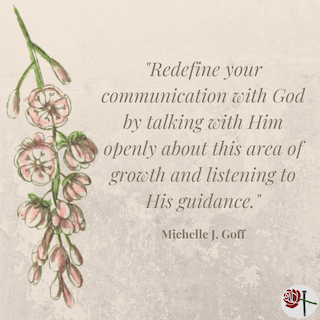-
Communication Redefined and the Common Threads
 Written by Michelle J. Goff
Written by Michelle J. Goff“May the words of my mouth and the meditation of my heart be pleasing in your sight…” (Ps. 19:14) “Out of the abundance of the heart, the mouth speaks…” (Luke 6:45)
Scripture is filled with instructions about our speech, as well as the importance of listening to God first, and then to others (James 1:19).
James, the New Testament “Proverbs,” dedicates about a fourth of his 5-chapter book to the tongue. The book of Proverbs includes more than 130 warnings about the tongue, our words, and other similar admonitions about communication—the speaking and the listening. These two books are not the only ones with instructions about how our communication should be redefined by God and His wisdom.
“Whoever keeps his mouth and his tongue keeps himself out of trouble” (Prov. 21:23).
“For we all stumble in many ways. And if anyone does not stumble in what he says, he is a perfect man, able also to bridle his whole body” (James 3:2).
Our words matter. They have an impact. “Sticks and stones may break my bones, but words will never hurt me.” Wrong! Words can build up or tear down, bless or curse. Both Solomon and James contrast the blessings and the curses that can come from what we say to others. They also both highlight the importance of seeking wisdom in our speech, attitudes, and actions. God promises that if we ask for wisdom, He will provide it (James 1:5).
We all readily accept the conceptual need for wisdom in our communication, both the listening and the speaking. However, we listen with our own filters in place. We make assumptions. We speak with the urgency of ensuring that our message is well-received and understood. How can we redefine our communication so that it is in line with the Spirit?
Top Three New Testament Suggestions for Redefining our Communication:
• “Let your speech always be gracious, seasoned with salt, so that you may know how you ought to answer each person” (Col. 4:6)
• “Do not let any unwholesome talk come out of your mouths, but only what is helpful for building others up according to their needs, that it may benefit those who listen” (Eph. 4:29).
• “Everyone should be quick to listen, slow to speak and slow to become angry” (James 1:19).Common Threads:
How do you want to grow and bloom in your redefined communication—more in the listening or the speaking? Please be specific and don’t forget to share it with an Iron Rose Sister so that you can pray together.Are there any barriers to communication that you know exist between you and another person? They may be thorns hindering the redefined communication.
One specific area in which you can dig deeper in redefined communication is to reflect on those with whom you communicate well. What’s different about that relationship compared with those with whom you don’t communicate well?
As you answer these questions, it can be easy to get defensive. I encourage you to bathe this topic in prayer. Redefine your communication with God by talking with Him openly about this area of growth and listening to His guidance.
-
How Jesus Taught Me to Pray
Written by Katie Forbess, President of the Board of Directors of Iron Rose Sister Ministries, with the collaboration of Jubilee Forbess, her daughter

I finally made it to my closet. I have wanted for years to create a place of prayer there. I have always felt the need, but it never happened until I was invited to spend 29 days in quiet prayer, for Advent 2022. I realized that shutting everything else out is so important because it makes you focus on the presence of God. By repeating, “reveal yourself to me,” I was strengthened in remembering that prayer is where you are alone, but with the Creator God. So, through growing up in the church and trusting God through many trying times, I have found the following lessons and am eager to share them. I wrote pages and pages of anecdotes narrating this story, but, like prayer, this doesn’t need to be so complicated.
The only way you can truly learn to pray is by doing it. Jesus told the disciples,
“When you pray,say: "`Father, hallowed be your name, your kingdom come. Give us each day our daily bread. Forgive us our sins, for we also forgive everyone who sins against us. And lead us not into temptation”(Luke 11:2-4)
Why? They were Jewish men who already prayed. They just needed a little tweaking, because… The Messiah was among them. They needed a little perspective. They needed a reminder of what they should ask for, what they should not ask for, and how forgiving others was the key to being forgiven. Prayer is a command.
My prayer life is what it is because of all the prayers and sermons and songs and books that have come before today. I reflected upon a short story, “Eleven,” that speaks of being all the ages and realized that my prayer life is all the teachings, plus the decision to engage daily. The Scripture. The songs. The answered prayers of 45 years. These were my teachers and my foundation, the pure material that has come through in life’s many trials. Prayer is like breathing.
Jeff lost his wallet. We prayed as we left to run errands. He found it while we were gone. Prayer is simple.
God is faithful when we take one step towards Him. I also believe that the verse in 2 Corinthians 12:10, “When I am weak, then I am strong,” is now etched on my heart. When we returned to the United States from Bolivia, I cried every Sunday during the singing. With emotions and transformation that I can’t explain well in words—works of the Spirit, I am sure—I poured out my soul to God in prayer. I chose not to wipe the tears away. Prayer is hard.
There was a time when I was driving every day after work to take college classes in Greeley, Colorado. On my way there, I was listening to rock music and reading the NY Times. It was a time that would end in a miscarriage, but before that, I realized that I needed to use my time differently and started to listen to purely KLOVE (Christian radio). The same thing seemed to happen in November of 2022. Things were so hard and I needed to be in constant prayer. Fire refines us and shows us who we really are. Sometimes it only warms me, other times it lights the way. Sometimes it burns me, and other times it sweats the impurities out of me. Prayer, then, is like fire.
I had to pray for the enemy. Keep quiet and let God fight for us. I had to reach out and contact the prayer warriors and ask them to pray for something I simply couldn’t talk about. I had to give thanks, because there was no doubt that the hand of God was in even this terrible situation. I had to trust that God would shut the mouths of lions and He seemed to surround me with lambs. Prayer is a gift.Looking through your life and the lessons that Jesus has taught you about prayer, which ones surprise you the most during a time of crisis?
-
My Communication with the Father
Written by Michelle J. Goff, Founder and Director of Iron Rose Sister Ministries

Daily, for about seven years, before, during, and after high school, I faithfully wrote in a prayer journal. I noted which chapters I read from the Old Testament, New Testament, and Proverbs. Since writing is one of the ways in which I process the world, it seemed appropriate that I would spend an allotted time each evening discussing my day with God, my thoughts, my fears, and my questions, in written form.
Most of the time, if I specifically addressed God by name, I would simply say, “Dear God.” I later learned to call on Him as the Great Physician, Comforter, Prince of Peace, Yahweh, Savior, etc. However, during those earlier years of prayer, if I had to pick one primary title that came to mind when I would address God, it was one of Heavenly Father.
“Heavenly” because I saw Him as other-worldly. He was seated up on His throne and would listen to us, inserting an occasional intervention on behalf of a truly worthy request. I would thank Him for His wisdom through the Proverbs and lament the many who did not heed His wisdom.
“Father” was because I emphasized a greater distinction between our Father in Heaven, His Son, Jesus, who came to earth to die on the cross to save us from our sins, and in whose name we pray. Finally, the Holy Spirit was the third title and one to whom I never prayed.
I now thank the Holy Spirit for interpreting my groans (Rom. 8:26) and ask Him to be my Guide, Comforter, and Reminder of Truth (John 14, 16). He is a seal guaranteeing my inheritance!
I have learned to thank Jesus for modeling obedience, for His selfless and sacrificial love, and for choosing what the world would deem unworthy followers to be His initial disciples. He is my Redeemer who ever lives and intercedes for me!
As I continued to address the Father in prayer, the meaning behind that title has evolved. My
relationship and communication with the Father have grown along with my intimacy with Him.
After returning to live in the U.S. after my years in Venezuela, I suffered extreme reverse culture shock. It was not a term that was commonly used at that time, nor was it a phenomenon I was warned about.
Walking through the aisles of the grocery store, I was overwhelmed by the hundreds of choices. I had come from a time and place in which you planned your menu based on whatever you found on the shelf that week, or what you had waited in a long line to obtain.
Navigating new relationships in a culture that felt long-forgotten, I had to explain why I knew nothing of TV shows, movies, commercials, or other “small talk” connection points. I counted down the days to my first visit back to Venezuela and the opportunity to introduce others to the reasons I might’ve been louder or culturally awkward.
A month or two after that return visit to Venezuela, life took another turn and my responsibilities doubled. Still disoriented and uncertain, I clearly remember an opportunity that was granted me to step away for a couple of days. That intentional time of prayer, reflection, Bible reading, and rest was desperately needed.
The most memorable moment from those days was when I pictured myself curled up on God’s lap, crying out my pain to Him. He was a welcoming Father who held my right hand, gently stroking my hair, as He comforted me. I was warmed by His embrace and drawn into a deeper level of trust. He could handle my grief. He could reorient my cross-cultural awkwardness. He could shoulder the weight of my added responsibilities. He would remain faithful and present. Always.
Beautifully, I knew that I could crawl back up into His lap at any time, which I did.
As my Father who loved me deeply, I could go to Him unencumbered by my hesitancy. As my Father who delighted in me, I could bound into His lap to prattle on about my greatest joys. As my Father who called me His daughter, I could hear Him whisper my name as the One who has always known me.
After that first time of picturing myself sitting in God’s lap and sloppily blubbering my heart’s deepest hurts, He truly became my Father.
If you have not been able to communicate with our Father to that level of intimacy, I invite you to start with simply entering His throne room and accepting His invitation to that depth of relationship with Him. It all starts with communication. You don’t have to know what to say. God knows your heart and doesn’t need you to speak a word.
-
One Kind Word Makes All the Difference
 Written by Michelle J. Goff
Written by Michelle J. GoffI am a tremendous klutz. I have been known to trip on air. During certain hormonal times, my spatial orientation is askew, and I am especially clumsy. My keys get dropped, coffee in spilled, furniture jumps out in front of me to stub my toe, and the counter I plan to lean on is a few inches further away than I calculated. However, I have been assured I am not the only one.
Similarly, I have days when my speech is more clumsy and less considerate. The “thank you” gets dropped. Careless words spill out of my mouth. The minutia of the day frustrates me to the point of hindering a smooth walk through my checklist. The Bible verse I read that morning, fully intending to lean on throughout the day, seems like a distant memory. However, I have been assured I am not the only one.
On those less-than-perfect days, my internal frustration level is high. The negative self-talk can quickly spiral me into a devilish trap. However, God is not surprised by my shortcomings. The kind word of grace He offers provides me with a lifeline, freeing me from the trap. And ladies, I’m not the only one for whom this promise is true. His grace is sufficient for us, for His power is made perfect in weakness (2 Cor. 12:9).
When I accept the kind word of grace from God, I am more ready to extend a kind word of grace to others. A simple word of kindness, to ourselves and to others, can make all the difference in how the rest of the day goes.
Accepting God’s kindness can be the first step in extending that kindness to others (Matt. 18:21-35). Kindness is an invitation into relationship. We are drawn to those who are kind. Consistent kindness draws others to us and provides us with the opportunity to share the source of our kindness.
A kind word to ourselves can dissipate the anger, the frustration, the impatience, and the guilt. A kind word to others allows the Spirit to flow through us, to do His work, to guide, and to comfort. Remember, kindness is one facet of the fruit of the Holy Spirit (Gal. 5:22-23)!
What is a simple kind word we can share with ourselves and with others? What difference have you seen a kind word make in someone’s life?
“A gentle answer turns away wrath, but a harsh word stirs up anger” (Prov. 15:1).
-
Rightly Work Communication
 Written by Kat Bittner, member of Iron Rose Sister Ministries Board of Directors in Colorado
Written by Kat Bittner, member of Iron Rose Sister Ministries Board of Directors in Colorado“A word fitly spoken is like apples of gold in settings of silver”(Ps. 25:11, NKJV)
Communication is rather peculiar. Isn’t it? It’s one of those things many find unpleasant and yet others thoroughly embrace. It can be cumbersome and hard. It can be impulsive and disparaging. But it can also be delightful and motivating. I’m definitely an embraceable communicator! No matter the fashion or form, communication will always be a central theme of humanity. Most assuredly, it is the central theme in our relationship with God.
“Continue earnestly in prayer, being vigilant in it with thanksgiving” (Col. 4:2, NKJV).
It behooves us then as Christians to be especially mindful of the care and practice we employ in our communication. Emulating Jesus in our speech is just as important as emulating Him in our actions because “a good man out of the good treasure of his heart brings forth good things…for by your words you will be justified, and by your words you will be condemned” (Matt. 12:35,37, NKJV).
As an image-bearer of God, I need to be purposely purposeful in my communication. And it takes work to do it right in accordance with God. To work communication rightly, we should practice it with intent. Here are a few suggestions from my own experience.
- Be mindful of those with whom you are speaking and their personality. I don’t approach my introverted, quiet friend about a conflict in the same way I do my very extroverted and assertive daughter. My own assertive personality might clash with my guarded friend. My daughter would say, “Bring it on!”
- Don’t assume that you and the other person (or people) have been genuinely heard in a conversation. Make sure all parties involved have some kind of affirmation. Question a speaker or reiterate conversation. Deaf ears can also befall the hearing.
“The single biggest problem in communication is the illusion that it has taken place” (George Bernard Shaw, playwright)
- Consider others first when you are communicating. Communication should always be tempered in the manner of Christ. “Kind words are like honey—sweet to the soul and healthy for the body” (Prov. 16:24, NLT). Our self-serving and self-righteous attitudes should be left at the foot of the cross (Ps. 55:22; Matt. 11:28).
- Remember that genuine communication involves listening, too. There is a time and a place for everything, “for every purpose under heaven…atime to keep silence, and a time to speak…” (Ecc. 3:1,7, NKJV). That means there’s a time to say nothing. And more often than not, it’s just what’s needed. There is nothing wrong with saying nothing, if nothing is gained by saying anything. Those who know me well, know I like to talk. If I’m quiet, it’s probably because I just don’t have anything beneficial to say. Really.
Our communication needs to be consistent with the will of God. It should stem from the Holy Spirit and keep us like-minded in Christ. Truth be told, our communication should be like Christ as should all things we do. And as in all things we are (1 Cor. 2:10-16).
What can you do to righty work communication in your life? How will you be a more Godly communicator?
-
The Power of Words
 Written by Kristi Bond, volunteer with Iron Rose Sister Ministries in Arkansas
Written by Kristi Bond, volunteer with Iron Rose Sister Ministries in ArkansasHow often do we do something without thinking it through first? The answer should be…constantly. In fact, God created our brain to direct various functions of the body without our having to think about them or be completely conscious of them. The actions and reactions of the nervous system, digestion and respiration, for example, do not need our attention.
One of the greatest problems that human beings have is that we often speak or have conversations as if our capacity to speak were merely one of these unconscious acts. We speak without meaning to. We don’t guard our tongue when we should. Or we let moments pass when we should have spoken the truth because we are not aware.
When God created the universe, light, land, animals – and humans – He did it with words. “And God said, ‘Let there be light,’ and there was light…God called the light ‘day,’ and the darkness he called ‘night’…” (Gen. 1:3-5, NIV). In the first chapter of her book Speak Love: Making Your Words Matter, Annie F. Downs writes that God could have created the world by coughing or with His hands or His thoughts, but He didn’t do it that way. More than half of the verses in Genesis 1 record God’s words - communication was integral to creation.
More than this, our Creator formed us in His image (Gen. 1:26-27), giving us also the capacity to communicate – and not only to communicate, but to create with our words. What is it that, at least in part, creates a friendship? A marriage? An idea put into practice, or a new business? Words! Communication gives life to desires and thoughts. We have the capacity to create because God gave us the gift of the spoken word.
In the first communication from Adam of which the Bible informs us, he himself gives names to the animals, in the same way that God named the day and the night: “…whatever the man called each living creature, that was its name” (Gen. 2:19b, NIV). Names are important, as are the words that we use to describe something. Our words contribute to forming perceptions of everything around us and even of what we think of ourselves. Most importantly, our words can impact the self-perceptions of others. Communication redefined recognizes the power of creation that exists in our words.
We are reminded of this power in Proverbs: “The soothing tongue is a tree of life, but a perverse tongue crushes the spirit” (15:4, NIV), and also “The tongue has the power of life and death, and those who love it will eat its fruit” (18:21, NIV).
If the power of life and death resides in our words, shouldn’t we consider them carefully? How is it that we can treat so casually this incredible gift that God has given us? When we put down another woman, when we disparage our husband or criticize our children without thinking, we sow thorns instead of planting a tree of life. We must give thought to the fruits that our words produce in the lives of others.
How can you use your words today to create life?
-
Your Speech Betrays You
 Written by Deanna Brooks, volunteer with Iron Rose Sister Ministries in Arkansas
Written by Deanna Brooks, volunteer with Iron Rose Sister Ministries in Arkansas“So, do you want a straw or a spoon with this?” the obviously new teenage employee asked as he handed me the hot fudge sundae at Sonic. His question surprised me, and I smiled and said, “I usually use a spoon,” and then he realized that you don’t eat a sundae with a straw. He ran back to get a spoon and just as he reached my car, he realized he brought another straw. The third time he brought a spoon, embarrassed as he kept apologizing. I told him it was OK… he was doing a good job, and he smiled and said, “Thank you for being kind and encouraging me.”
As I sat in the heat enjoying the cool ice cream, two Scriptures went through my mind. “Set a guard, O LORD, over my mouth; keep watch over the door of my lips” (Ps. 141:3 ESV). “Let the words of my mouth and the meditation of my heart be acceptable in your sight, O LORD, my rock and my redeemer” (Ps. 19:14 ESV).
As a disciple of Jesus Christ my speech is being refined to be different from that of the world. At times of inconvenience or frustration or when we are caught off-guard, it is easy to blurt out something we should not say.
As a disciple, I also need to remember cultures are different. When I went to Scotland as a college student, we were given a list of words that have a different meaning in the UK. Even in the United States there are cultural differences from one area to another in meanings of some words, and we need to be aware of these differences.
Paul mentioned how the disciple should speak when he wrote: “Let no corrupting talk come out of your mouths, but only such as is good for building up” (Eph. 4:29 ESV).
He also wrote, “Let there be no filthiness nor foolish talk nor crude joking, which are out of place, but instead let there be thanksgiving” (Eph. 5:4 ESV).
In Acts 4:36, Barnabas is called “son of encouragement.” While we are not given a lot of detail, I can hear him telling John Mark later in the book, “You can do this… forget what happened last time.”
Jesus told His followers, “On the day of judgment people will give an account for every careless word they speak” (Mt. 12:36 ESV).
Words... are the major way we communicate with others. James 1 and 3 tell us to “bridle” our tongue, which means “restrain” or “control.” What we say and how we say it often leaves an impression that is never forgotten, and just because we think it doesn’t mean we need to say it.
In Matthew 26:73 Peter was told, “Your speech betrays you,” and while this may have referred to a Galilean accent, it is something we need to think on: How can our speech make others aware we are a follower of the Christ?
See more photos on our Photo Gallery page.
(c) Iron Rose Sister Ministries. Site setup by Perfect Fit Web Design; Flag icons by Free Flag Icons

